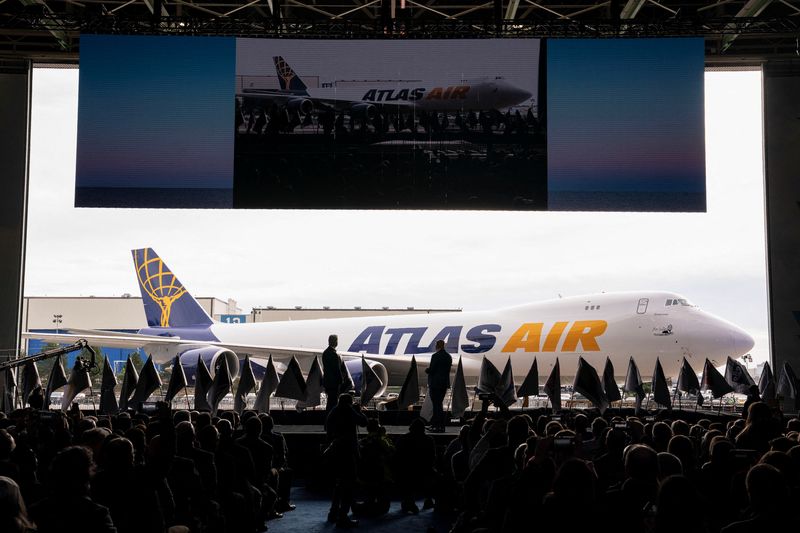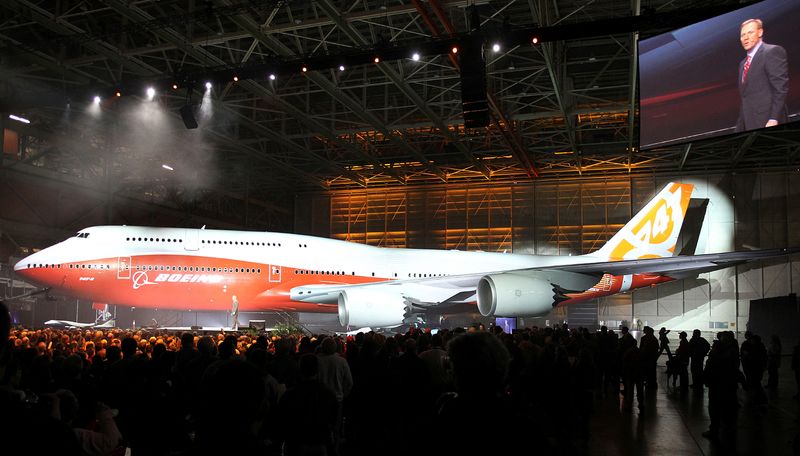By Valerie Insinna
SEATTLE (Reuters) -Boeing bid farewell to the iconic 747, delivering the final plane to Atlas Air (NASDAQ:AAWW) on Tuesday afternoon and marking an end of an era when the first-ever "jumbo jet" ruled the skies.
Thousands of Boeing (NYSE:BA) employees – including some of the so-called "Incredibles" who developed the jet in the 1960s – watched the last delivery of the historic plane, which brought air travel to the masses and represented an indelible slice of Americana.
The event at the mammoth manufacturing plant was capped off by a celebrity appearance by John Travolta, who recounted learning to fly the 747-400 as an ambassador for Qantas Airlines. “[It was] the toughest program that any commercial pilot will ever have to endure,” said Travolta, who called the jet the “most well thought out and safest aircraft ever built.”
Known as the "Queen of the Skies," the 747 was the world's first twin-aisle jetliner, which Boeing designed and built in 28 months and Pan Am introduced in 1970.
"It's the airplane that redefined the industry and redefined air travel," said Guy Norris, co-author of "Boeing 747: Design and Development Since 1969."
British billionaire entrepreneur Richard Branson, who was inspired to start an airline with a single Boeing 747 after getting stuck on a delayed flight, earlier on Tuesday called it a "wonderful beast" as he bid farewell.
Boeing's Everett, Washington, facility has been the 747's production site since the plane's conception. Built in 1967 to produce the mammoth jet, it remains the world's largest manufacturing plant according to Boeing.
But after five decades, customer demand for the 747 eroded as Boeing and Airbus developed more fuel efficient two-engine widebody planes. When Boeing confirmed in July 2020 that it would end 747 production, it was already only producing at a rate of half an aircraft a month.
Boeing delivered five 747s in 2022, while in 1990, the peak delivery year of the bestselling 747-400 version, Boeing delivered 70 747s.
As different sections of the last 747 – the wings or fuselage structures, for example – were complete, the production line "just slowly started to shut down," said Kim Smith, Boeing's vice president and general manager for the 747 and 767 programs.
Smith said all 747 program workers were transferred to other jobs or voluntarily retired.
The last 747 rolled out on Dec. 7, capping the program at 1,574 total. The plane has since completed inspections and flight tests, flying to Portland over the holidays to get a paint job. The plane will fly off on Wednesday morning to Atlas’ headquarters in Cincinnati, Ohio.
While Boeing also builds the 767 and 777 in Everett, the company has yet to decide which program will permanently take over the 747 production bay, which is currently being used for 787 inventory and 777X work, Smith said.

Boeing will remain tied to the 747 through the aftermarket business and the Air Force One replacement program, which Boeing won in 2018.
The heir apparent to the 747, the 777X will not be ready for delivery until 2025, but Boeing Chief Executive David Calhoun focused his goodbye on that future: “The 777, the next plane to dominate this space, displaced all its competition just like that - and we haven’t even introduced the best version.”
